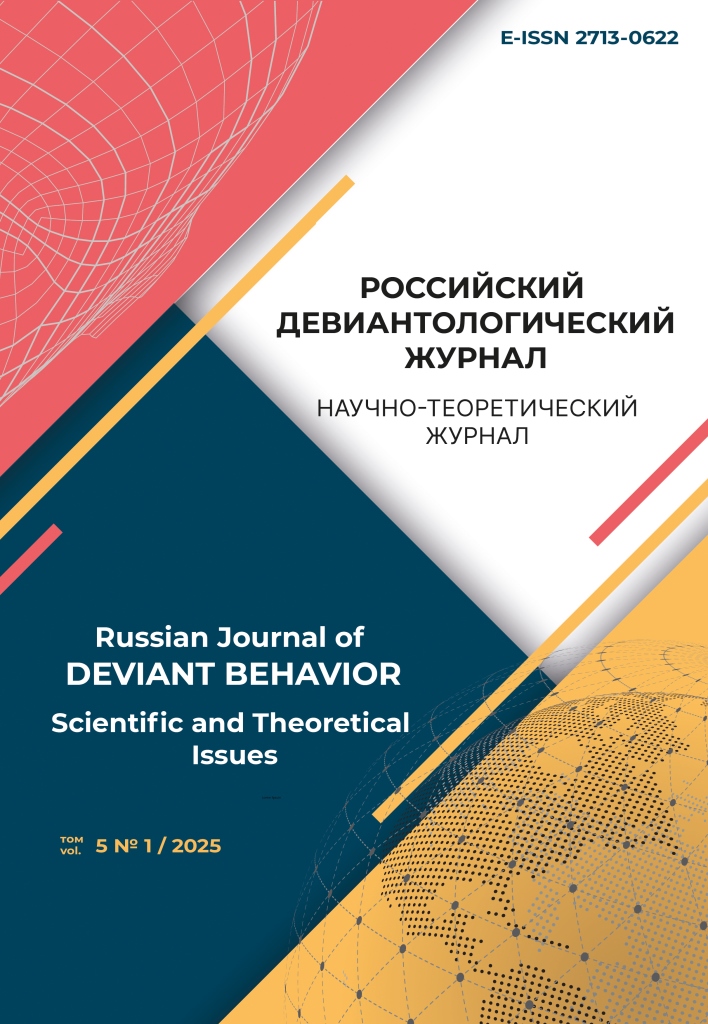Ryazan, Orel, Russian Federation
UDC 159.9
UDC 343.8
Introduction. The article discusses the importance of achievement motivation and motivation to avoid failure in alcohol-dependent inmates for their decision to participate in treatment and rehabilitation programmes. Assuming that a person has motives directly related to his practical activities – achievement motivation and motivation to avoid failure, which plays a great role in making any decisions, in particular, in relation to our study – it is the rehabilitation course completion in order to abstain from alcohol. The purpose of the research: to study the features of value orientations, level of development of achievement motivation and motivation to avoid failure in convicts who have undergone rehabilitation measures for complete withdrawal from alcohol consumption, and convicts who have not undergone such rehabilitation. Research hypothesis. We assumed that the intensity of achievement motivation is related to willingness to participate in treatment. Research methods. The analysis of the psychological literature in order to define the concepts of “motivation”, “achievement motivation”, and “motivation to avoid failure” was conducted. The level of development of achievement motivation and motivation to avoid failure in the groups of convicts who agreed to participate in the rehabilitation programme and refused it was revealed. The research was based on general scientific methods: analysis, synthesis, induction and deduction; methods of empirical research, which included psychodiagnostic techniques - “Diagnosis of achievement motivation” by T. Ehlers, “Diagnosis of failure avoidance motivation” by T. Ehlers, statistical method - Kruskal-Wallis nonparametric H-test. Research results. A statistically significant difference in failure avoidance motivation (p = 0.03238 at p < 0.05) was found between the groups of inmates who agreed and did not agree to participate in rehabilitation programmes. The results of the conducted research allow us to state that inmates who agreed to participate in rehabilitation programmes have a statistically higher average level of expression of failure avoidance motivation compared to inmates who refused to participate in rehabilitation activities. This data allows to conclude that there is a direct relationship between the expression of failure avoidance motivation and the probability of obtaining consent from inmates with alcohol dependence to participate in rehabilitation programmes.
motivation, achievement motivation, failure avoidance motivation, alcohol-dependent inmates, rehabilitation
1. Antonyan, E. A., Grishko, N. A., Yakovleva, I. Yu. (2016). Trud osuzhdennyh: monografiya. Moskow: OOO «Nauchnyj konsul'tant».
2. Antonyan, Yu. M., Kolyshnicyna, E. M. (2017). Motivaciya povedeniya osuzhdennyh: monografiya. Moskow: YUNITI-DANA.
3. Artamonova, N. M., Degtyarev, A. L., Karpuhin, A. A. i dr. (2016). Issledovanie resursov lichnosti bol'nyh alkogolizmom osuzhdennyh. NovaInfo.Ru, 3 (42), 283–285.
4. Gordeeva, T. O. (2016). Motivaciya: novye podhody, diagnostika, prakticheskie rekomendacii. Sibirskij psihologicheskij zhurnal, 62, 38–53.
5. Izyumov, D. V., Skorkin, O. V., Zhilin, V. E. i dr. (2016). Metody povysheniya motivacii osuzhdennyh k trudu: prakticheskoe rekomendacii. Ryazan': Akademiya FSIN Rossii.
6. Il'in, E. P. (2011). Motivaciya i Motivy. Saint Petersburg: Piter. URL: https://rusneb.ru/catalog/000199_000009_004925138/
7. Kazberov, P. N. (2023). Aspekty resocializacii osuzhdennyh, zavisimyh ot psihoaktivnyh veshchestv. Psihologiya. Istoriko-kriticheskie obzory i sovremennye issledovaniya, 12 (3-4-1), 246–252. EDN: https://elibrary.ru/PYCJDY.
8. Magomed-Eminov, M. Sh. (1987). Motivaciya dostizheniya: struktura i mekhanizmy: avtoref. dis. ... kand. psihol. nauk. Moskow.
9. Marishin, S. V. (2018). Osobennosti motivacii osuzhdennyh s razlichnym urovnem samoocenki, sostoyashchih na uchete v ugolovno-ispolnitel'noj inspekcii. Vestnik instituta: prestuplenie, nakazanie, ispravlenie, 3 (43), 103–108. URL: https://cyberleninka.ru/article/n/osobennosti-motivatsii-osuzhdennyh-s-razlichnym-urovnem-samootsenki-sostoyaschih-na-uchete-v-ugolovno-ispolnitelnoy-inspektsii
10. Piyukova, S. S. (2020). Formirovanie motivacii k trudu u osuzhdennyh v ispravitel'nyh uchrezhdeniyah: psihologicheskij aspekt. Vestnik Samarskogo yuridicheskogo instituta, 4 (40), 100–106. https://doi.org/10.37523/SUI.2020.40.4.016
11. Rozhkov, E. M. (2014). Motivaciya dostizheniya uspekha i izbeganiya neudach v rabotah otechestvennyh i zarubezhnyh uchenyh. Sovremennaya nauka, 3, 44–46. URL: https://cyberleninka.ru/article/n/motivatsiya-dostizheniya-uspeha-i-izbeganiya-neudach-v-rabotah-otechestvennyh-i-zarubezhnyh-uchenyh
12. Rubinshtejn, S. L. (2024). Osnovy obshchej psihologii. Moskow: AST.
13. Sostoyanie prestupnosti v Rossii za yanvar'-dekabr' 2023 goda (2024). FKU «Glavnyj informa-cionno-analiticheskij centr. Moskow: Ministerstvo vnutrennih del Rossijskoj Federacii. URL: https://portal.tpu.ru/SHARED/n/NIKOLAENKOVS/student/risk_management/%D0%A1%- D0%BE%D1%81%D1%82%D0%BE%D1%8F%D0%BD%D0%B8%D0%B5%20%D0%BF%D1%- 80%D0%B5%D1%81%D1%82%D1%83%D0%BF%D0%BD%D0%BE%D1%81%D1%82%D0- %B8%20%D0%B2%20%D0%A0%D0%BE%D1%81%D1%811.pdf
14. Stroeva, G. V. (2014). Faktory povysheniya motivacii osuzhdennyh k samoispravleniyu. Nauch-no-metodicheskij elektronnyj zhurnal «Koncept», 6 (iyun'), 121–125. URL: http://e-koncept.ru/2014/14161.htm.
15. Surovickaya, Yu. Yu., Madimuhametov, M. N. (2023). Ponyatie o motivacii v psihologii. Nauka i real'nost', 1 (13), 36–40. URL: https://cyberleninka.ru/article/n/ponyatie-o-motivatsii-v-psi-hologii
16. Tarasova, I. Yu. (2023). Sushchnost' ponyatiya «motivaciya k izbeganiyu neudach» v otechestvennoj psihologii. Vestnik nauki, 3 (2 (59)), 117–120. URL: https://cyberleninka.ru/article/n/suschnost-ponyatiya-motivatsiya-k-izbeganiyu-neudach-v-otechestvennoy-psihologii
17. Hekkhauzen, H. (2001). Psihologiya motivacii dostizheniya (per. s angl.). Saint Petersburg: Rech'.
18. Shtefan, E. F. (2023). Osobennosti cennostno-motivacionnoj sfery u osuzhdennyh muzhchin, sklonnyh k agressivnomu povedeniyu. Mir nauki. Pedagogika i psihologiya, 11 (5). EDN: https://elibrary.ru/MWL-CWQ.
19. Atkinson, J., & Feather, N. (1966). A theory of achievement motivation. New York, NY: Wiley and Sons.
20. McClelland, D. C. (1976). The Achievement motive. Irvington Publishers : distributed by Halsted Press.
21. McClelland, D. C., & Steele, R. S. (1973). Human motivation, a book of readings. Morristown, N. J.: General Learning Press. URL: https://archive.org/details/humanmotivationb0000mccl/page/n5/mode/2up
22. Murray, H. A., & McAdams, D. P. (2010). Explorations in Personality, 70th edn (New York, 2007; online edn, Oxford Academic, 1 Apr. 2010). https://doi.org/10.1093/acprof:o-so/9780195305067.001.0001
23. Rotter, J. B. (1966). Generalized expectancies for internal versus external control of reinforcement. Psychological Monographs: General and Applied, 80 (1), 1–28. https://doi.org/10.1037/h0092976














